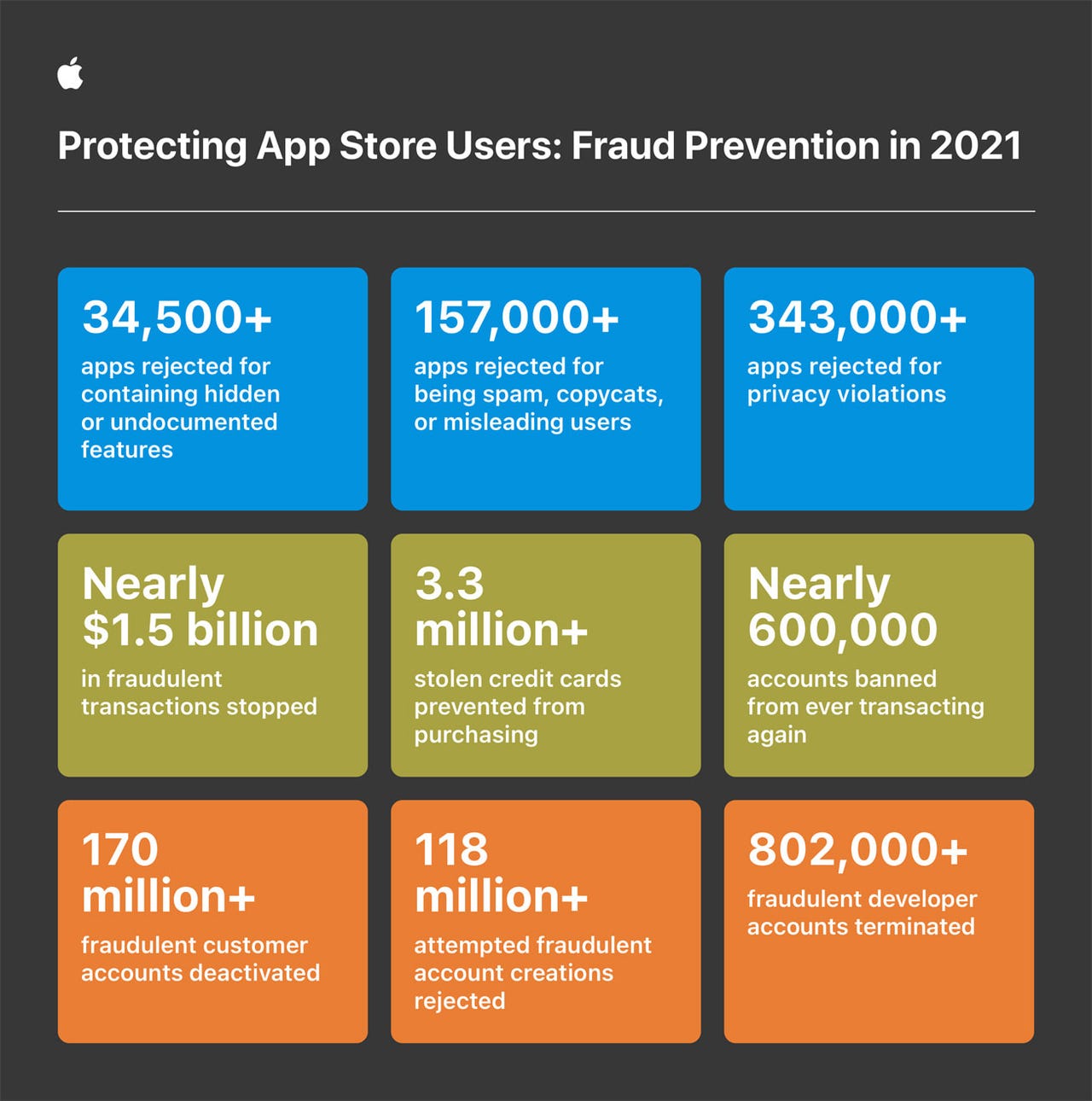Apple: These are the sorts of apps we blocked from our App Store last year


Apple says it prevented over 1.6 million risky and untrustworthy apps and app updates from reaching the App Store and stopped over $1.5 billion in fraudulent transactions in 2021.
Apple produced its first fraud prevention analysis last year, detailing it had prevented one million potentially bad apps from the App Store and protected customers from nearly $1.5 billion in potentially fraudulent transactions in 2020.
ZDNET Recommends
In 2021, Apple rejected 34,500 apps for containing hidden or undocumented features, down from 48,000 in 2020. It also rejected 157,000 apps for being spam, copycats, or misleading to users, up from 150,000 in 2020. And it rejected 343,000 apps for privacy violations in 2021, up from 215,000 a year prior.
SEE: iOS 16: Apple could bring this handy new feature to your iPhone in 2022
Apple in 2021 also deactivated 170 million fraudulent customer accounts, rejected 118 million attempted fraudulent account creations, and terminated 802,000 fraudulent developer accounts. In 2020, these figures were respectively 244 million, 424 million, and 470 million.
"Human review is the distinguishing component of the App Review process," Apple says in a blogpost, noting the team reviews every app and every update to ensure compliance with Apple's App Store guidelines.
Apple also uses "proprietary tools that leverage machine learning, heuristics, and data accumulated since the App Store first launched" to detect an app's potential issues and violations.
Google in April reported that it had blocked 1.2 million apps from the Play Store for policy violations in 2021, preventing billions of harmful installations on Android devices.
During the App Review in 2021, Apple also rejected 835,00 problematic new apps and 805,000 app updates. These weren't rejected for fraud but may have been apps that contained bugs that affect functionality or apps that needed improvements in their moderation mechanisms for user-generated content, according to Apple.
Apple also tackled "nefarious developers" attempting to bypass the App Review by creating an app and then changing its concept or functionality once it's been approved. Apple removed 155,000 apps from the App Store for these kinds of violations.
The company is addressing the problem of illegitimate app ratings and reviews. Fake reviews have in the past been a problem on the Google Play Store, which Google attempted to address in 2016 with new automated filters.
As Apple notes, fake ratings and reviews pose a serious risk to the App Store because it can lead users to download or buy an untrustworthy app that wrongly earned users trust though misrepresentation.
Apple processed over 1 billion ratings and reviews in 2021 and blocked 94 million reviews and 170 million ratings that failed to meet Apple's moderation standards. Apple also removed 610,00 reviews after they were published and uses raised concerns about the reviews.
Targeting fraudulent developer accounts, beyond the 802,000 developed accounts it terminated last year, Apple rejected over 153,000 developer enrollments.
Apple, which is strongly against side-loading apps on iOS devices, says it also blocked 53,600 apps that were being distributed on pirate storefronts.
"These storefronts distribute malicious software often designed to resemble popular apps – or that modify popular apps without their developers' authorization – while circumventing the App Store's security protections," Apple says.
SEE: The best 5G phones: Which flagship comes out on top?
Apple also this month blocked 3.3 million instances of apps distributed through its Enterprise Developer Program. Some malicious developers use this to bypass the App Review or target enterprise customers. Apple blocked 3.2 million of these in a one month period in 2020.
The company also stopped 3.3 million stolen payment cards from being used to make purchases on the App Store, and it banned nearly 600,000 accounts from transacting again.